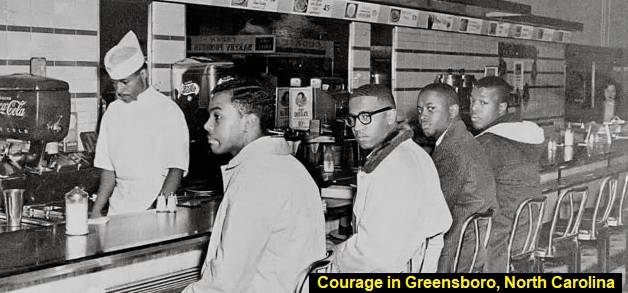On February 1, 1960, the landscape of civil rights activism in the United States underwent a deep and meaningful transformation when four black college students from the North Carolina Agricultural and Technical College in Greensboro, North Carolina, staged a sit-in at a segregated Woolworth lunch counter. Who today remembers that in 1960 the lunch counter at a local department store was segregated? It seems unbelievable to us today – but it was true. Can you imagine that just sitting at the counter at a department store in 1960 was an unbelievable act of courage and rebellion? This historic event, which eventually became known as the “Greensboro Sit-In”, marked a key moment in the struggle against racial segregation and discrimination, setting the stage for a new wave of activism that would resonate across the nation.
The four courageous students—Ezell Blair Jr., David Richmond, Franklin McCain, and Joseph McNeil—embarked on a mission that would challenge the deeply ingrained norms of racial segregation prevalent in the Southern United States during the 1960s. The Woolworth lunch counter, like many public facilities at the time, enforced a policy of segregation, denying service to African Americans solely based on their race. Frustrated by the systemic injustice they faced, the students decided to take a stand and demand the right to be served equally.
The decision to stage a sit-in was not taken lightly. The Greensboro Four were well aware of the potential consequences, including arrest and violence. However, fueled by the principles of equality and justice, they courageously occupied seats at the Woolworth lunch counter, defying the racial norms that sought to relegate them to second-class citizenship. The simplicity of their act—an act as basic as requesting service at a lunch counter—held immense symbolic power, challenging the very foundations of segregationist policies.
The sit-in quickly garnered attention and support, not only within the local community but also across the nation. The peaceful and dignified protest struck a chord with people who were increasingly disillusioned with the prevailing racial injustices. News of the sit-in spread like wildfire, inspiring similar protests in other cities and igniting the flame of the civil rights movement.
The Greensboro Four’s sit-in embodied the spirit of nonviolent resistance championed by leaders like Martin Luther King Jr. The disciplined adherence to nonviolence was a strategic choice that aimed to expose the moral bankruptcy of segregation while highlighting the dignity and strength of the African American community. The sit-in became a model for subsequent civil rights demonstrations, influencing the strategies employed by activists in their quest for equality.
In the face of adversity, the Greensboro Four persevered. Their steadfast commitment to justice and equality led to the eventual desegregation of the Woolworth lunch counter, marking a tangible victory in the broader struggle against racial discrimination. The sit-in’s success resonated far beyond Greensboro, inspiring a generation of activists to challenge institutionalized racism through peaceful means.
The Greensboro sit-in of 1960 stands as a pivotal moment in the history of the civil rights movement. It exemplifies the power of peaceful protest and civil disobedience in dismantling oppressive systems. The actions of Ezell Blair Jr., David Richmond, Franklin McCain, and Joseph McNeil served as a catalyst for change, encouraging others to join the fight for a more just and equitable society. Their bravery and resilience remind us that ordinary individuals, when united by a common cause, can ignite a spark that transforms the course of history.
HAPPY ENDING: Not many stories such as these have, if you will, a happy ending but amazingly, four months after their historic sit-in, the same “Greensboro Four” Ezell Blair Jr., David Richmond, Franklin McCain, and Joseph McNeil WERE ACTUALLY SERVED LUNCH! AT THAT VERY Woolworth lunch counter where they had staged their sit-in!


Get involved!
Comments